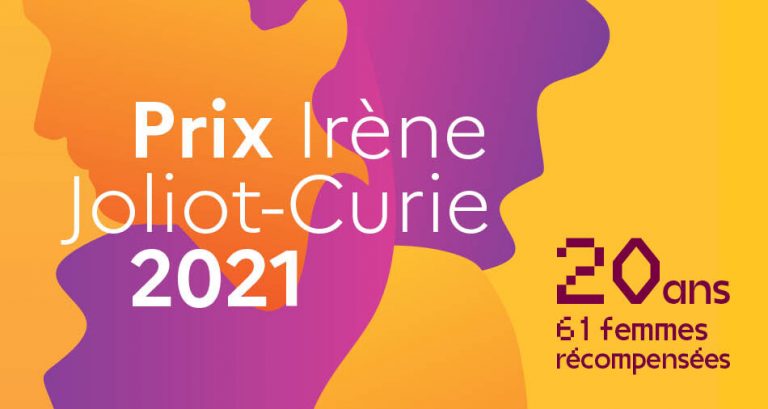
The Irène Joliot-Curie Prize ceremony, which rewards women scientists, this year featured five female researchers instead of three. On the occasion of the 20th anniversary of the prize, a “Special Prize for Commitment” had been announced and finally two candidates were selected. This year’s winners include Julie Grollier, “Woman Scientist of the Year”.
Each year, the Irène Joliot-Curie Prize rewards exemplary careers in both public and private research. Three prizes are awarded by the Ministry of Higher Education, Research and Innovation, with the support of the Académie des Sciences and the Académie des Technologies, which form the jury.
Each year, the jury of the Irène Joliot-Curie Prize awards three prizes:
- The “Woman Scientist of the Year” prize is awarded to a woman who has made an outstanding contribution to the field of public research through the openness of her subject, the importance of her work and recognition in her scientific field both nationally and internationally. It is endowed with 40,000 euros.
- The “Young Woman Scientist” prize highlights and encourages a young woman who distinguishes herself through her career and work, making her a talented specialist in her field. It is endowed with 15,000 euros.
- The “Woman, Research and Enterprise” prize rewards a woman who has developed scientific and/or technical innovations in a research and development function, working within a company or contributing to the creation of a company. It is endowed with 15,000 euros.
The laureates
For this 20th edition, the jury, chaired by Catherine Cesarsky, member of the French Academy of Sciences, has chosen to award
- Julie Grollier, “Woman Scientist of the Year” Award
Julie Grollier is Director of Research at CNRS – CNRS/Thales Joint Physics Unit, University of Paris-Saclay. A fundamental physicist, she is a pioneer and one of the world leaders in the development of neuromorphic computing. Her work is part of the advancement of artificial intelligence technologies, leading to the invention of electronic components and circuits inspired by the functioning of the brain, the field of neuromorphic computing. His research, which often exploits his previous discoveries in spin electronics (spintronics), between physics and artificial intelligence, and which aims to produce “green” electronic chips that are intelligent, useful and have very low power consumption, earned him his award.
She will receive an endowment of 40,000 euros.
- Cécile Charrier, “Young Woman Scientist” award
Cécile Charrier, a doctor of science, has been head of the “Development and Plasticity of the Synapse” team at the Institute of Biology of the Ecole Normale Supérieure de Paris since 2020. She is awarded for her research studying how new genes, which appeared during human evolution, modify the development and plasticity of synapses (functional contact area that is established between two neurons), an important step to better understand the vulnerability of the human brain to diseases and in particular to neurodevelopmental disorders, in order to better treat brain diseases. She is actively committed to supporting women in research, particularly during the difficult periods of pregnancy and infancy (schedule adjustments, breastfeeding rooms, etc.).
She will receive an endowment of 15,000 euros.
- Odile Hembise Fanton d’Andon, “Woman, Research and Enterprise” prize
Odile Hembise Fanton d’Andon has a doctorate in mechanics and has been Managing Director and co-founder of ACRI since 1989 and co-founder and Managing Director of ACRI-ST, ACRI’s operating company, since 2000.
Her work has focused on satellite inversion methods and derived products, atmospheric chemistry and climatology. In 1989, she co-founded ACRI with the objective of better understanding the environment by bringing together expertise in the fields of mathematics, physics and fluid dynamics. The company specialises in remote sensing from space and is a key player in satellite observation programmes in Europe. Odile Hembise Fanton d’Anton was awarded for her research on simulation tools designed to improve knowledge of the environment and its protection.
She will receive an award of €15,000.
The “Special Commitment Prize” created for the 20th anniversary of the Irène Joliot-Curie Prize
To highlight the crucial role of scientists in the fight against the pandemic and to mark the 20th anniversary of the prize, the Minister Frédérique Vidal wished to create a “Special Commitment Prize” which rewards a woman whose work has been relevant to the fight against the COVID-19 epidemic, in particular by providing global or specific responses to the problems encountered by France in the context of the health crisis.
Due to the very high quality of the applications submitted, two women received this prize:
- Vittoria Colizza, Inserm Research Director, Pierre Louis Institute of Epidemiology and Public Health, SUMO Team (Communicable Diseases Surveillance and Modelling) has made important contributions in epidemiology, particularly on the H1N1, MERS-CoV, Ebola and Chikungunya epidemics. During the COVID-19 epidemic, she alerted the authorities to the very high risk of a European development of the epidemic and her work focused on the successive waves of the pandemic. She was awarded a prize for her multidisciplinary work on the characterization and modeling of the spread of emerging infectious diseases, including COVID-19
- Odile Launay, professor of medicine, coordinator of the Vaccinology Clinical Investigation Centre at Cochin Pasteur, is involved in the national coordination of vaccine research on COVID-19 in order to improve knowledge of the effectiveness of vaccines and to promote confidence in them. She has been involved in several important initiatives including a study called Covi compare – which examines the immune response of older subjects – and another which examines the response of immunocompromised populations. These projects are of primary importance in defining vaccine policy. She is therefore being recognized for her commitment to clinical vaccine research on COVID-19 and her engagement with the general public.
The winners will receive an endowment of 40,000 euros.
Translated from Julie Grollier, lauréate du Prix de la « Femme scientifique de l’année » du 20e Prix Irène Joliot-Curie









